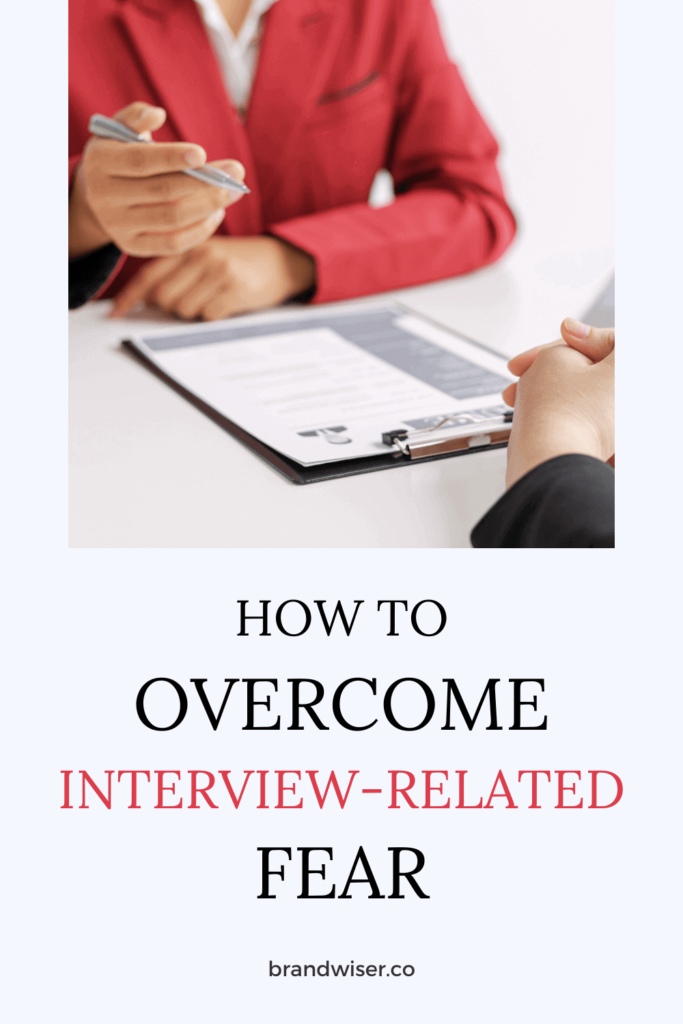Do you often experience anxiety and nervousness prior to your job interviews? While some level of interview jitters is common, if your nervousness prevents you from showcasing your skills and abilities, it can hinder your chances of making a good impression. So if you want to ace your next job interview and land your dream job, it’s time to overcome your interview anxiety. But how?
If you’re like most job seekers, the thought of going into a job interview can make you feel anxious. You might worry about not being prepared enough, forgetting important details, or not making a good impression on the interviewer. However, it’s essential to remember that interview-related fear is a common feeling, and there are effective ways to overcome it.
Read on to find some simple, yet effective ways to overcome the “interview nerves” once and for all. Here’s what we’ve covered:
Understanding Your Interview Anxiety
What Causes Interview-Related Fear and How It Affects Your Performance
Understanding your interview-related fear is an essential step in overcoming it. Fear of interviews is common and can stem from various sources, such as fear of rejection, fear of failure, or fear of the unknown. It’s important to acknowledge and accept your fear, rather than trying to suppress it. Acceptance can help you adopt a growth mindset and view the interview as an opportunity for growth and learning, rather than a threat.
Once you understand the source of your interview anxiety, you can take practical steps to overcome it. This will probably not come as a surprise, but one of the most effective methods is to practice. The more you practice answering common interview questions, the more comfortable and confident you will become. You can practice with a friend, family member, or even by recording yourself and watching it back. Just keep in mind that practicing doesn’t mean memorizing your answers. That would only make you sound robotic and rehearsed during the interview, which can harm your chances of landing the job.
Instead, focus on understanding your skills and experiences, and how they relate to the job requirements. This will allow you to respond to questions more naturally and demonstrate your qualifications in a genuine way. Remember, the goal of the interview is to have a conversation with the interviewer and showcase your potential as a candidate. So, while practice is important, be sure to also stay flexible and adaptable during the actual interview.
Preparation is Key
How Proper Preparation Can Help You Overcome Your Interview Anxiety
One of the most important aspects of interview preparation is research. Before your interview, it’s essential to research the company, the industry, and the position you are applying for. This can help you understand the company culture, their goals and values, and the requirements of the job. Research can also help you identify potential interview questions and tailor your responses accordingly. Take some time to review the company’s website, social media accounts, and any recent news articles. This will give you a good understanding of the company’s current state and future plans.
Another key element of preparation is practice. Practicing common interview questions can help you feel more comfortable when you will be chatting with your actual interviewer. You can practice with a friend or family member to get feedback on your responses and delivery. It’s important to practice your body language and tone of voice as well, as these non-verbal cues can greatly impact your overall impression. You can also practice asking questions, such as inquiring about the company culture or specific aspects of the job. Proper preparation can help you feel more in control and less anxious during the interview process, allowing you to focus on showcasing your skills and qualifications.
Practice Makes Perfect
How Practice Can Help You Overcome Your Interview Anxiety
You are probably already tired of the word “practice”, but believe me: the more you practice for your job interview, the more comfortable and confident you will feel during the actual interview. Practice can help you overcome your interview anxiety by allowing you to become familiar with the questions, structure, and environment of the interview. This familiarity can help you feel more relaxed and focused, allowing you to present your best self to the interviewer.
When it comes to practicing for your interview, there are several things you can do. First, create a list of common interview questions and practice answering them. You can also ask a friend or family member to conduct a mock interview with you. This can help you become more comfortable with the back-and-forth nature of an interview and allow you to practice your responses in a more realistic setting. Additionally, consider recording yourself practicing and reviewing the footage. This can help you identify areas for improvement in your body language, tone of voice, and overall delivery. By practicing consistently, you can build your confidence and feel more in control during the actual interview.
Mindset Matters
How to Develop a Winning Mindset and Overcome Your Interview Anxiety
Your mindset is a powerful tool that can either make or break your chances of success in a job interview. If you approach the interview with a negative mindset, filled with self-doubt and anxiety, you are more likely to perform poorly. However, if you develop a winning mindset, you can overcome your interview-related fear and showcase your strengths and qualifications with confidence.
One way to do so is by visualizing a successful interview. Close your eyes and imagine yourself confidently answering interview questions, engaging with the interviewer, and leaving a positive impression. This mental rehearsal can help you overcome any negative thoughts or beliefs that may be holding you back. Another effective technique is positive self-talk. Instead of focusing on your weaknesses and flaws, focus on your strengths and accomplishments. Tell yourself that you are qualified for the job—after all they wouldn’t have invited you if you were not qualified, right?—, and that you have what it takes to succeed in the interview.
In addition to visualization and positive self-talk, it’s important to stay focused on the present moment during the interview. Don’t let your mind wander to negative thoughts or future outcomes. Instead, stay present and focused on the interviewer and the questions being asked. Remember that the interviewer wants you to succeed! They are not there because they want to see you fail or make mistakes. By maintaining a positive and present mindset, you can overcome your interview-related fear and give your best performance.
Embrace the Challenge
How to Embrace the Challenge of Your Job Interview and Overcome Your Fear
Your job interview can feel intimidating, but it’s essential to view it as an opportunity to demonstrate your value as a potential employee. Embracing the challenge means adopting a growth mindset and recognizing that every interview is a chance to learn and improve. Rather than focusing solely on the outcome of the interview, try to shift your attention to the process of preparation and the skills you can develop through the experience.
To overcome your interview-related fear, it’s essential to practice reframing your negative thoughts into positive ones. For example, instead of thinking, “I’m going to fail this interview,” try to reframe your thinking to, “I’m going to do my best and learn from the experience, regardless of the outcome.” By adopting this mindset, you can build resilience and view your job interview as an opportunity for growth rather than a threat to your self-worth.
Another helpful strategy for embracing the challenge of your job interview is to approach it with a sense of curiosity and excitement. Rather than fixating on your fear, try to focus on the potential opportunities and benefits that come with the job. This can help you shift your mindset from one of anxiety to one of anticipation and enthusiasm. By embracing the challenge of your job interview and viewing it as an opportunity for growth and learning, you can overcome your interview-related fear and showcase your best self to potential employers.
Seek Support
How Seeking Support Can Help You Overcome Your Interview-Related Fear
Seeking support is an essential part of overcoming interview-related fear. It’s totally okay to feel nervous or anxious before an interview, and reaching out to a friend, family member, or mentor for support can help alleviate some of that stress. Talking to someone who has been through the interview process before can provide valuable insight and advice on how to approach the interview and overcome any fears or concerns you may have.
You can also seek support from a career coach or counselor who specializes in interview preparation. They can provide personalized guidance and support tailored to your individual needs and help you develop strategies to overcome your interview-related fear.
Conclusion
Overcoming interview anxiety is crucial if you want to land your dream job. By understanding what causes your fear, preparing properly, practicing frequently, developing a winning mindset, embracing the challenge, and seeking support, you can significantly improve your chances of success during your job interview. Remember, it’s natural to feel nervous and anxious, but with the right approach, you can turn those negative emotions into positive energy that will help you shine during your interview.
Take the time to research the company, the industry, and the position you are applying for, and practice common interview questions to gain more confidence. Work on developing a positive and winning mindset, and embrace the challenge of your job interview. Finally, don’t hesitate to seek support from friends, family, or a professional coach to help you stay focused and motivated.
By following these tips and techniques, you can overcome your interview anxiety and impress your potential employer with your skills, experience, and confidence.
Good luck with your next job interview!



